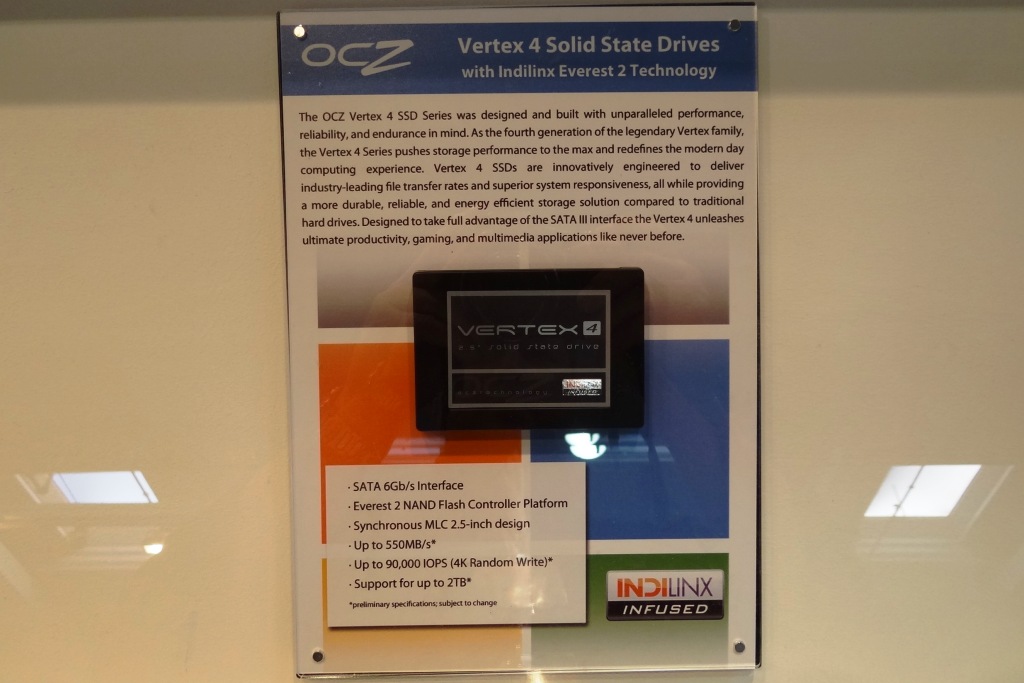Our first stop at CEBit 2012 in Hannover, Germany, was at the OCZ booth and were we in for a shock. It wasn’t ten minutes since the doors opened and the crowd surrounding OCZ enterprise products was unbelievable. So much for getting those early shots right?
Hoping to be the first to visit the OCZ booth, we think even they were caught off guard with respect to such early morning enterprise SSD interest. On another front, OCZ has officially unveiled their V4 with no release date as of yet.
The Vertex 4 has been on the minds of many SSD enthusiasts for some time now and is built on the Everest 2 platform and will contain synchronous NAND flash memory.
 Although the below shots run a bit short, the V4 is expected to hit highs of 550MB/s transfer speed with 90, 000 IOPS.
Although the below shots run a bit short, the V4 is expected to hit highs of 550MB/s transfer speed with 90, 000 IOPS.
 Just as interesting, however, was this picture of OCZ’ expected release of the Kilimanjaro platform where the soon to be released Z-Drive R5 is pictured with a 2.5″ and mSATA form factor. This platform is a joint venture between OCZ and Marvell and, if these specs are correct, that 2.5″ SSD will push 1GB/s transfer speeds with 100,000 IOPS. This would be the top speed seen in any typical notebook form factor yet.
Just as interesting, however, was this picture of OCZ’ expected release of the Kilimanjaro platform where the soon to be released Z-Drive R5 is pictured with a 2.5″ and mSATA form factor. This platform is a joint venture between OCZ and Marvell and, if these specs are correct, that 2.5″ SSD will push 1GB/s transfer speeds with 100,000 IOPS. This would be the top speed seen in any typical notebook form factor yet.
 Next up on the list is the new OCZ Lightfoot which is an external SSD based on Intel’s Thunderbolt interface. This SSD will be available in capacities of 128, 256 and 512GB and will have transfer speeds of 750MB/s.
Next up on the list is the new OCZ Lightfoot which is an external SSD based on Intel’s Thunderbolt interface. This SSD will be available in capacities of 128, 256 and 512GB and will have transfer speeds of 750MB/s.
 Last but not least, we have one of our first pictures of our reviewer, Derek Tokar, and OCZ’ Jessica Luken who needs absolutely no introduction whatsoever. This is Derek’s first trip with ‘The Team’ and we can imagine his feelings of loss and abandon in a sea of technology and electronics.
Last but not least, we have one of our first pictures of our reviewer, Derek Tokar, and OCZ’ Jessica Luken who needs absolutely no introduction whatsoever. This is Derek’s first trip with ‘The Team’ and we can imagine his feelings of loss and abandon in a sea of technology and electronics.
Stay tuned later as we try and get near the OCZ enterprise products later for some shots and detail.
 The SSD Review The Worlds Dedicated SSD Education and Review Resource |
The SSD Review The Worlds Dedicated SSD Education and Review Resource | 
Where does all of this leave the OCZ-Sandforce relationship?? Is it fading?
It’s just like any other SSD manufacturer. LSI doesn’t make their own SSD’s (besides the WarpDrive) and just license the controller technology.
OCZ has an advantage because they can bring to market the best solutions, whether that’s with an in-house controller (like Everest 2) or use a 3rd party solution (like Sandforce or even Marvell).
Just surprised that Marvell is making such a performance jump over Sandforce. In order to get that 1Gb/s transfer speed thay have to be doing some RAID striping on the drive. (I’m assuming that transfer speed is INTERNAL speed only).
Right. It’d completely saturate SATA 6Gb/s. Talk about a controller with versatility though. Should be a real winner in the Enterprise space.
Not necessarily RAID striping.
A few months back, we proposed a “SATA-IV” standard which ups the clock rate to 8G and adopts the 128b/130b “jumbo frame” now in the PCI-E 3.0 specification:
8G / 8 bits per byte = 1.0 GBps.
I don’t know if this is what they are planning, however; and, obviously, this requires upgrades to the controllers at both ends of the data cable.
Nevertheless, as we explained in a Thread posted in this Forum, this is a very logical extension of the PCI-E 3.0 “topology” — using flexible cables to supplement the hard-wired traces on motherboard layers:
https://www.thessdreview.com/Forums/ssd-discussion/1555.htm
MRFS
It’s called RAISE (Redundant Array of Independent Silicon Elements) and it is already done in ALL SSDs. the reason being is that the fastest commercially available NAND chips right now are only capable of 166 MT/s IIRC (Maybe 200?). Next year toggle 2 (400 MT/s) NAND should be available.
SSD controllers are like RAID controllers in that they come with number of available channels (sandforce = 8) so 8 NAND cells can be “striped” together. To saturate the BUS. As density and speed increase we see faster chips being raided together or additional controllers being tossed into the mix to create more channels. Blowing well past the SATA 6Gbps standard and necessitating PCIExpress slots.
Since the V4 is using synch nand, I’m betting that Ocz will make it’s 24nm toggle debut with a Vertex 4 MaxIOP…:D
so…. thunderbold is the new stuff
maybe if they removed their heads from their……….. and weren’t running it in IDE MODE we would see better performance…….. HELLO!!!!!!!!!!!!!!!!!!!
Just noticed the IDE mode too….bet they did it on purpose to keep people guessing the full potential…I hope, lol.
She’s Hot! but Im guessing this comment will be removed because Im stating whats really hot here :p